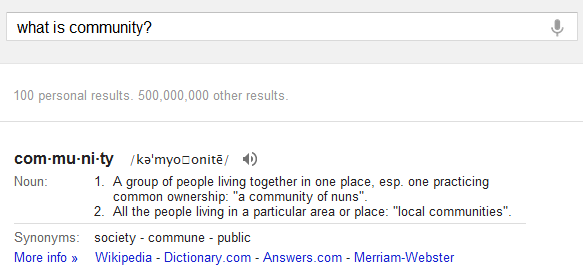Like it or not, the posts you've been writing, the links you've been sharing, the comments you've responded to, it's all working toward a goal that you might not even known existed.
I'm not talking about brand recognition or SEO value. I'm talking about community.
It's the one thing that most bloggers don't even realize they have when they start blogging. Even some of the most experienced bloggers don't get this concept, mostly because it's hard to define.
In the textbook sense, community is (thank you, Merriam-Webster):
- a unified body of individuals
- a group linked by a common policy
- a body of person or nations having a common history or common social, economic, and political interests
- a body of persons of common and especially professional interests scattered throughout a larger society
But in reality, in application, it's a lot more than that. Community is what keeps your readers coming back to you. Community is what gets your post shared and what powers your online visibility. Community is the reason people buy your info products, take the time to add in their two cents, or email your posts to their friends. Like it or not, community is what drives a blog's success - and it's about time for SEOs to get a grasp on this.
It's not about pointing links back to your domain or building PageRank. It's not about link bait, link juice, or any buzz word. It's also not about creating content solely for the purpose of boosting ranking potential.
The best blogs, i.e. the blogs that truly work, are blogs that understand that community is the foundation of what makes this whole internet thing work. It's always been that way. Actually, when you really think about it, most storytelling is driven by community. We've been doing this since we were first able to communicate with one another:
- A Brief History of Storytelling
- Storytelling for Community Engagement
- Storytelling: Written, Audio, Visual Digital Storytelling
- Re-Weaving Community, Creating the Future
Community is being seen, recognized, and acted upon. It should be a primary goal for every SEO campaign.
People, not search engines, are the ones who can benefit from finding you. Communicating with people, not search engines, allows for you to convert, lend credibility, and build trust. People form relationships with you or your brand. They give feedback. They respond. They listen to what you have to say. It's not about rankings in SEO. It's about being found and more importantly, keeping people on the page once they do click through from the SERPs.
So how do you do that? Here are a few ways:
- 5 Expert Lessons For Building Your Blog Community
- 8 Tips for Building Community on Your Blog
- The One Great Key to Building a Blog Community and Changing Lives
- 12 Keys to Building Your Online Community
- 27 Blogging Secrets to Power Your Community
- Community Spark
- 8 Steps to Growing Your Blog Community One Person At a Time
- How to Build Community on Your Blog
Please, dear SEOs, remember that your blog is more than just another tactic. It's a community. It lives, it breathes, and it deserves your attention. Your community deserves to have great content that's consistent. It deserves to have relevant and interesting topics to share with others. It deserves to have something that looks great, is accessible, and makes it feel valued.
The secret to the best SEO doesn't lie in formulas or theories. It lies in practice. By practicing effective blogging, the kind that builds community, you have the greatest possible potential to do well in getting found online. In the end, this is what we do. This is our profession - and the idea of community extends far beyond the blog associated with your domain. It should be an element present in all of your strategies. We optimize for search engines, yes, but we should also be optimizing for people. Always.
If you liked this, you might also enjoy 10 Ways to Build Your Blog Readership


